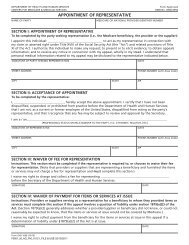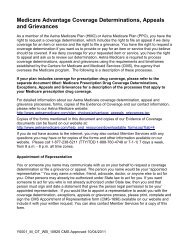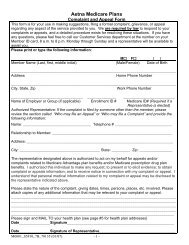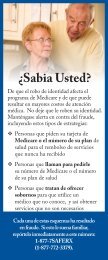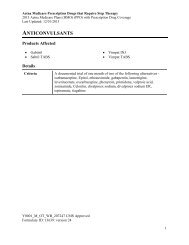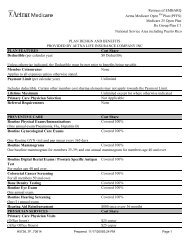- Page 1 and 2: DirectoryPhysicians, Hospitals andO
- Page 5: Important Disclosure InformationAet
- Page 9 and 10: For these purposes “generally acc
- Page 11 and 12: ■ Coverage for an item or service
- Page 13 and 14: 3. Aetna will notify you and/or the
- Page 15: hospitals and other caregivers), pa
- Page 19 and 20: Additional Important DisclosureInfo
- Page 21: In some regions, the PCP can receiv
- Page 25 and 26: Additional Important DisclosureInfo
- Page 27: Health Insurance Portability andAcc
- Page 31 and 32: Información importante para elcons
- Page 33 and 34: un deducible, sus costos pueden ser
- Page 35 and 36: Pago de reclamos para proveedores q
- Page 37 and 38: capacitado para centrarse en los ri
- Page 39 and 40: 2. Aetna conducirá la reconsiderac
- Page 41 and 42: Quejas sobre la calidad de la atenc
- Page 43: Algunas de las maneras en que se ut
- Page 47 and 48: Más información importante para e
- Page 49: Se remunera a los médicos de nuest
- Page 53 and 54: Más información importante para e
- Page 55: La ley de portabilidad yresponsabil
- Page 58 and 59:
Network Hospitals and Skilled Nursi
- Page 60 and 61:
Network Hospitals and Skilled Nursi
- Page 62 and 63:
Network Hospitals and Skilled Nursi
- Page 64 and 65:
Network Hospitals and Skilled Nursi
- Page 67 and 68:
Institutes of ExcellenceTransplant
- Page 69 and 70:
Institutes of ExcellenceBone Marrow
- Page 71 and 72:
Institutes of ExcellenceHeart/LungG
- Page 73 and 74:
Institutes of ExcellenceLiverRobert
- Page 75 and 76:
Institutes of ExcellencePancreasTho
- Page 77 and 78:
Institutes of ExcellenceMARYLANDUni
- Page 79 and 80:
Nationally Contracted Walk-In Clini
- Page 81 and 82:
Nationally Contracted Walk-In Clini
- Page 83 and 84:
Nationally Contracted Walk-In Clini
- Page 85 and 86:
Nationally Contracted Walk-In Clini
- Page 87 and 88:
Nationally Contracted Walk-In Clini
- Page 89 and 90:
Nationally Contracted Walk-In Clini
- Page 91 and 92:
Nationally Contracted Walk-In Clini
- Page 93 and 94:
Nationally Contracted Walk-In Clini
- Page 95 and 96:
Nationally Contracted Walk-In Clini
- Page 97 and 98:
Network Primary Care Physicianswww.
- Page 99 and 100:
Network Primary Care PhysiciansCham
- Page 101 and 102:
Network Primary Care PhysiciansFort
- Page 103 and 104:
Network Primary Care PhysiciansGalv
- Page 105 and 106:
Network Primary Care PhysiciansHarr
- Page 107 and 108:
Network Primary Care PhysiciansHarr
- Page 109 and 110:
Network Primary Care PhysiciansHarr
- Page 111 and 112:
Network Primary Care PhysiciansHarr
- Page 113 and 114:
Network Primary Care PhysiciansHarr
- Page 115 and 116:
Network Primary Care PhysiciansHarr
- Page 117 and 118:
Network Primary Care PhysiciansHarr
- Page 119 and 120:
Network Primary Care PhysiciansHarr
- Page 121 and 122:
Network Primary Care PhysiciansHarr
- Page 123 and 124:
Network Primary Care PhysiciansHarr
- Page 125 and 126:
Network Primary Care PhysiciansHarr
- Page 127 and 128:
Network Primary Care PhysiciansHarr
- Page 129 and 130:
Network Primary Care PhysiciansHarr
- Page 131 and 132:
Network Primary Care PhysiciansHarr
- Page 133 and 134:
Network Primary Care PhysiciansJeff
- Page 135 and 136:
Network Primary Care PhysiciansMont
- Page 137 and 138:
Network Primary Care PhysiciansMont
- Page 139:
Network Primary Care PhysiciansOran
- Page 142 and 143:
BrazoriaNetwork Obstetricians and G
- Page 144 and 145:
HarrisNetwork Obstetricians and Gyn
- Page 146 and 147:
HarrisNetwork Obstetricians and Gyn
- Page 148 and 149:
HarrisNetwork Obstetricians and Gyn
- Page 150 and 151:
HarrisNetwork Obstetricians and Gyn
- Page 152 and 153:
JeffersonNetwork Obstetricians and
- Page 155 and 156:
Network Specialistswww.aetna.com
- Page 157 and 158:
Network SpecialistsBrazoriaLAKE JAC
- Page 159 and 160:
Network SpecialistsBrazoriaUrologyB
- Page 161 and 162:
Network SpecialistsFort BendSands,
- Page 163 and 164:
Network SpecialistsFort BendSteyner
- Page 165 and 166:
Network SpecialistsFort BendOncolog
- Page 167 and 168:
Network SpecialistsGalvestonSpeech
- Page 169 and 170:
Network SpecialistsGalvestonMercado
- Page 171 and 172:
Network SpecialistsHarrisConsultati
- Page 173 and 174:
Network SpecialistsHarrisMcChesney,
- Page 175 and 176:
Network SpecialistsHarrisAudiologyJ
- Page 177 and 178:
Network SpecialistsHarrisorSt. John
- Page 179 and 180:
Network SpecialistsHarrisCardiology
- Page 181 and 182:
Network SpecialistsHarrisWan, Clift
- Page 183 and 184:
Network SpecialistsHarrisBasa, Amel
- Page 185 and 186:
Network SpecialistsHarrisNemoto, Da
- Page 187 and 188:
Network SpecialistsHarrisChandrakar
- Page 189 and 190:
Network SpecialistsHarrisKumashi, P
- Page 191 and 192:
Network SpecialistsHarrisKesavan, R
- Page 193 and 194:
Network SpecialistsHarrisVo, Thinh
- Page 195 and 196:
Network SpecialistsHarrisMorell, Gu
- Page 197 and 198:
Network SpecialistsHarrisHarati, Ya
- Page 199 and 200:
Network SpecialistsHarrisComair, Yo
- Page 201 and 202:
Network SpecialistsHarrisOncologyAk
- Page 203 and 204:
Network SpecialistsHarrisTalukdar,
- Page 205 and 206:
Network SpecialistsHarrisHeggeness,
- Page 207 and 208:
Network SpecialistsHarrisWimberley,
- Page 209 and 210:
Network SpecialistsHarrisYoo, John
- Page 211 and 212:
Network SpecialistsHarrisor18220 St
- Page 213 and 214:
Network SpecialistsHarrisPodiatryAr
- Page 215 and 216:
Network SpecialistsHarrisPan, Simon
- Page 217 and 218:
Network SpecialistsHarrisLechin, Al
- Page 219 and 220:
Network SpecialistsHarrisMarymont,
- Page 221 and 222:
Network SpecialistsHarrisPribil, St
- Page 223 and 224:
Network SpecialistsHarrisDow, Dougl
- Page 225 and 226:
Network SpecialistsHarrisIliskovic-
- Page 227 and 228:
Network SpecialistsHarrisNovick, Sh
- Page 229 and 230:
Network SpecialistsHarrisPhysical M
- Page 231 and 232:
Network SpecialistsHarrisMorris, Mi
- Page 233 and 234:
Network SpecialistsHarrisOrellana,
- Page 235 and 236:
Network SpecialistsHarrisPhysical T
- Page 237 and 238:
Network SpecialistsHarrisCardiology
- Page 239 and 240:
Network SpecialistsHarrisBoone, C.
- Page 241 and 242:
Network SpecialistsJeffersonHaney,
- Page 243 and 244:
Network SpecialistsJeffersonPodiatr
- Page 245 and 246:
Network SpecialistsJeffersonSotolon
- Page 247 and 248:
Network SpecialistsMontgomeryOrthop
- Page 249 and 250:
Network SpecialistsMontgomeryORS Ph
- Page 251 and 252:
Network SpecialistsMontgomeryUrolog
- Page 253 and 254:
Network SpecialistsMontgomeryLeboue
- Page 255 and 256:
Network SpecialistsMontgomeryPodiat
- Page 257 and 258:
Network Behavioral Health Providers
- Page 259 and 260:
Network Behavioral Health Providers
- Page 261 and 262:
Network Behavioral Health Providers
- Page 263 and 264:
Network Behavioral Health Providers
- Page 265 and 266:
Network Behavioral Health Providers
- Page 267 and 268:
Network Behavioral Health Providers
- Page 269 and 270:
Network Behavioral Health Providers
- Page 271 and 272:
Network Behavioral Health Providers
- Page 273 and 274:
Network Behavioral Health Providers
- Page 275 and 276:
Network Behavioral Health Providers
- Page 277 and 278:
Network Behavioral Health Providers
- Page 279:
Network Behavioral Health Providers
- Page 282 and 283:
BrazoriaNetwork Eye Care ProvidersB
- Page 284 and 285:
Fort BendNetwork Eye Care Providers
- Page 286 and 287:
Fort BendNetwork Eye Care Providers
- Page 288 and 289:
HarrisNetwork Eye Care ProvidersTra
- Page 290 and 291:
HarrisNetwork Eye Care ProvidersCha
- Page 292 and 293:
HarrisNetwork Eye Care ProvidersJoh
- Page 294 and 295:
HarrisNetwork Eye Care Providersor1
- Page 296 and 297:
HarrisNetwork Eye Care ProvidersBra
- Page 298 and 299:
HarrisNetwork Eye Care ProvidersGee
- Page 300 and 301:
HarrisNetwork Eye Care Providersor9
- Page 302 and 303:
HarrisNetwork Eye Care Providersor7
- Page 304 and 305:
HarrisNetwork Eye Care ProvidersShu
- Page 306 and 307:
HarrisNetwork Eye Care ProvidersZis
- Page 308 and 309:
HarrisNetwork Eye Care ProvidersFan
- Page 310 and 311:
HarrisNetwork Eye Care ProvidersOpt
- Page 312 and 313:
JeffersonNetwork Eye Care Providers
- Page 314 and 315:
MontgomeryNetwork Eye Care Provider
- Page 317 and 318:
Network Dental Providerswww.aetna.c
- Page 319 and 320:
Network Dental ProvidersHarrisAetna
- Page 321 and 322:
Network Dental ProvidersHarrisAetna
- Page 323 and 324:
Network Dental ProvidersHarrisAetna
- Page 325 and 326:
Network Dental ProvidersHarrisAetna
- Page 327 and 328:
Network Dental ProvidersHarrisAetna
- Page 329:
Network Dental ProvidersMontgomeryA
- Page 332 and 333:
TEXASMAIL ORDERAETNA RX HOME DELIVE
- Page 334 and 335:
Network PharmaciesWALGREENS* ......
- Page 336 and 337:
TARGET PHARMACY....................
- Page 338 and 339:
Network PharmaciesCENTRAL HOUSTON P
- Page 340 and 341:
Network PharmaciesNORTHWOOD PHARMAC
- Page 342 and 343:
Network PharmaciesWAL-MART PHCY ...
- Page 344 and 345:
La PorteKROGER.....................
- Page 346 and 347:
Network PharmaciesNederlandCVS PHAR
- Page 348 and 349:
Network PharmaciesRANDALLS PHARMACY
- Page 350 and 351:
Acute Rehabilitation FacilityOther
- Page 352 and 353:
Dialysis CenterOther Participating
- Page 354 and 355:
Durable Medical EquipmentOther Part
- Page 356 and 357:
Durable Medical Equipment - NATIONA
- Page 358 and 359:
Home Health Care AgencyOther Partic
- Page 360 and 361:
Hospice-NATIONALOther Participating
- Page 362 and 363:
LaboratoryOther Participating Netwo
- Page 364 and 365:
LaboratoryOther Participating Netwo
- Page 366 and 367:
Radiology CenterOther Participating
- Page 368 and 369:
Sleep Diagnostic CenterSleepWell La
- Page 370 and 371:
Index of Network Providers Speaking
- Page 372 and 373:
Index of Network Providers Speaking
- Page 374 and 375:
Index of Network Providers Speaking
- Page 376 and 377:
Index of Network Providers Speaking
- Page 378 and 379:
Index of Network Providers Speaking
- Page 380 and 381:
Index of Network Providers Speaking
- Page 382 and 383:
Index of Network Providers Speaking
- Page 384 and 385:
Index of Network Providers Speaking
- Page 387 and 388:
Index of Network Providerswww.aetna
- Page 389 and 390:
Anderson, Martin L., III, DDS 21347
- Page 391 and 392:
Bollman, Rhonda Gayle, DDS112717...
- Page 393 and 394:
Chen, William Min Choy, MD 77471...
- Page 395 and 396:
Digilova, Irina, MD...............2
- Page 397 and 398:
Gee, Kevin, OD....................2
- Page 399 and 400:
Higgins, Barbara, OD...............
- Page 401 and 402:
Keene, Linda L, MSW.........208, 21
- Page 403 and 404:
Lewis, Glen E., MD ................
- Page 405 and 406:
McPhail, Karen A., OTR.............
- Page 407 and 408:
Nguyen, Dawn P., MD 92015.........4
- Page 409 and 410:
Perez, Jennifer Leigh, DDS 112717..
- Page 411 and 412:
Resnick, Harvey, MD 856823 ........
- Page 413 and 414:
Shelby, Harold T., MD...........129
- Page 415 and 416:
Sweeney, D. Sean, DPM.....159, 179,
- Page 417 and 418:
Veerasamy, Anitha D., MD 895352....
- Page 419 and 420:
Index of Network ProvidersZiegenbei
- Page 421 and 422:
Providers who have been duly recogn


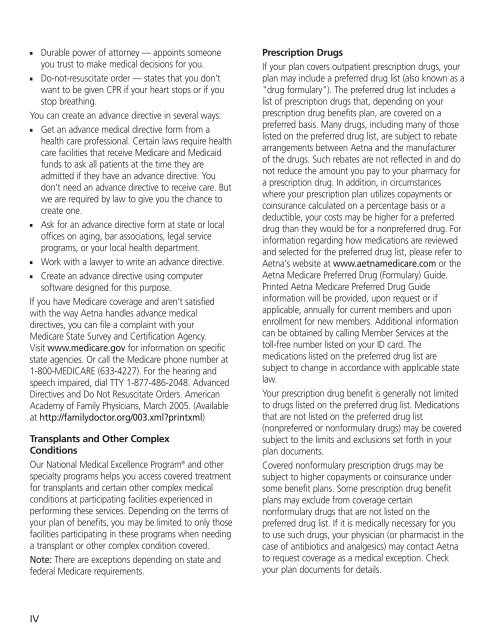


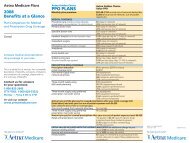
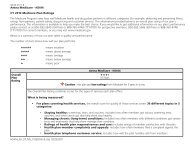
![[PDF] Directory - Aetna Medicare](https://img.yumpu.com/50361210/1/190x247/pdf-directory-aetna-medicare.jpg?quality=85)
